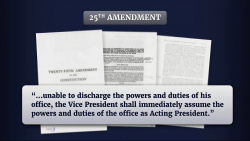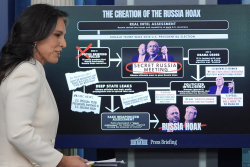
Many believe that masculine industries, such as military and defense, are naturally immune to left-wing race and gender ideologies. This is mostly a myth. These institutions are organized according to prestige and profit—and when those signals point to “woke,” industry leaders have dutifully followed.
Take America’s largest defense contractor, Lockheed Martin. As we have previously reported, after the rise of the Black Lives Matter movement, Lockheed adopted radical DEI policies and, in one instance, required white men in leadership positions to attend a racial reeducation program and atone for their “white male privilege.”
Finally, a reason to check your email.
Sign up for our free newsletter today.
Now, a whistleblower has come forward to claim that Lockheed executives were so committed to DEI policies that they awarded some year-end bonuses based on employees’ skin color, rather than performance—in open violation of civil rights law.
The story began in December 2022, when the whistleblower was preparing recommendations for the aeronautics division’s year-end bonuses. The whistleblower was proud of the work the team had done to calculate awards. But soon after the bonuses were submitted for approval, higher-ups told the whistleblower that there was a problem: the “Comp Adder” list, which named recipients of bonus compensation, had too many white employees on it.
Santiago Bulnes, a vice president who now leads engineering on Lockheed’s F-35 program, wrote an email to the whistleblower. “I got a call from [human resources director] La Wanda [Moorer] last night regarding diversity stats on comp adder,” Bulnes, who did not respond to a request for comment, said. “They took a run at getting your few approved and we’re told that we need to fit in the box. I asked her to send you the list of diversity names to simplify the task of finding the best in the group.”
Next, our source claims, officials in Lockheed’s human resources department made the demand explicit. One communication instructed the whistleblower to add more than a dozen minorities to the list and recommended removing an equal number of “non-minority” employees. The implication was clear—“increasing POC for Comp Adder will result in removing equal count of non-minority”—and the instructions were deliberate, recommending specific race swaps by manager. For example, for one team, human resources officials instructed the whistleblower to “increase POC 4 and decrease non-minority 4.”
Our source was outraged. The company was requiring managers to reward employees “on the basis of their skin color alone and contrary to documented performance.” The whistleblower tried to protest this decision and filed an ethics complaint, arguing that the policy was unethical and could expose the company to legal liability, but management insisted. “Our HR counsel told me that while this may present business risk, it was the ‘less[e]r of two evils.’”
One driving force behind Lockheed’s discriminatory policy, according to our source, was La Wanda Moorer, the director of human resources. When the whistleblower asked Moorer, who did not respond to a request for comment, what would happen if the team could not find enough minorities to replace white workers on the bonus list, Moorer responded forcefully. “[T]he preference is for you to get there,” Moorer wrote. “If you are coming back and saying you can’t get there and it’s unnatural than [sic] I think that changes the conversation as a business area what risk are we willing to assume, and should we get into a situation where there is legal activity that takes place then you will be part of that process . . . . We haven’t ever been in a situation where we haven’t gotten there.”
Moorer’s last comment is worth highlighting. It suggests this wasn’t the first time Lockheed had engaged in a secret, post hoc process to strip bonuses from top performers and instead award them to employees who checked diversity boxes. And in the preceding sentence, Moorer seems to acknowledge that such policies, which are inherently discriminatory, could violate the law. Apparently, the company’s commitment to “diversity” trumped any other consideration.
In the end, the whistleblower followed the order and “swapped” 18 whites for 18 minorities, solely on the basis of race. A few months later, our source left the firm and penned a resignation letter to colleagues.
“I, at the direction of Lockheed, have actively discriminated against higher performing individuals, denied them higher pay they earned, denied them the opportunity to be motivated as a top performer,” the letter read. “Not only does this force a violation of my conscience that forces me to leave, but we could have 18 valid individual claims with associated public embarrassment and lost customer trust.”
A Lockheed spokesperson responded to our request for comment, insisting that “Lockheed Martin is a meritocracy” and is “committed to recognizing performance, rewarding excellence, and upholding the principles of merit and fairness.” The spokesperson claimed that our reporting “raise[s] concerns that we are taking seriously and investigating.”
Nevertheless, a reckoning may be coming. Earlier this year, President Trump signed an executive order prohibiting federal contractors from maintaining discriminatory DEI programs. His administration has signaled interest in prosecuting cases of anti-white discrimination. Though Lockheed quickly shuttered its DEI initiatives after Trump’s executive order, its actions earlier in the post-George Floyd era cannot be erased. As the whistleblower warned, racial discrimination is illegal—and the company could pay a heavy price.
One hopes that it will. For decades, companies could deliberately discriminate against white men without consequence. But that calculus is changing. The Department of Justice Civil Rights Division, now led by conservative super-lawyer Harmeet Dhillon, has sought to return the civil rights regime to its original mission: to enforce the law equally for individuals of all racial groups.
Dhillon might initiate this policy with a high-profile target—perhaps the nation’s largest defense contractor.
Photo by Orjan F. Ellingvag/Corbis via Getty Images
City Journal is a publication of the Manhattan Institute for Policy Research (MI), a leading free-market think tank. Are you interested in supporting the magazine? As a 501(c)(3) nonprofit, donations in support of MI and City Journal are fully tax-deductible as provided by law (EIN #13-2912529).
Source link


















